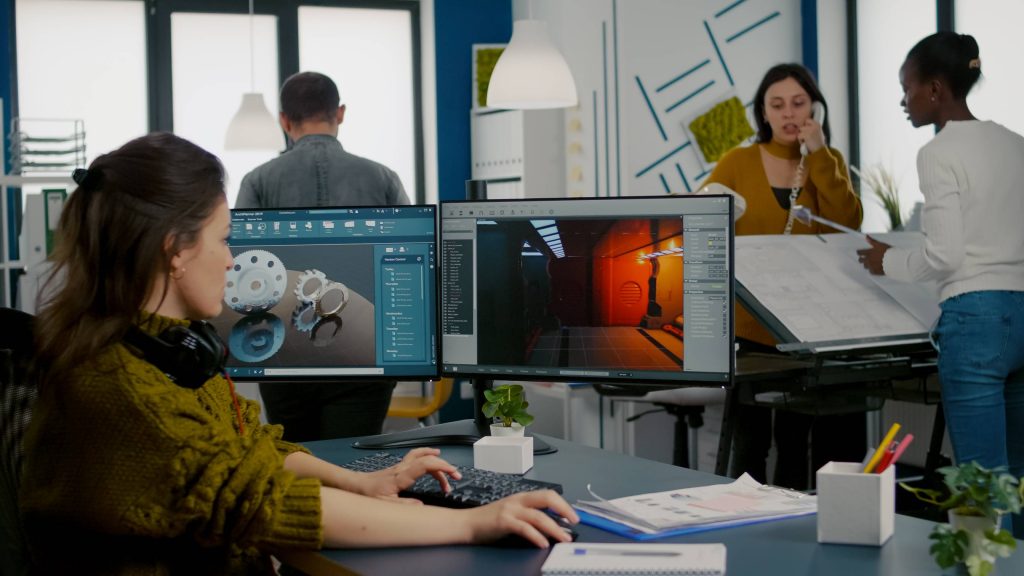The year 2021 will be remembered as a year of unprecedented changes. Although several companies soon adjusted to the “new normal,” some who did not were left behind. Organisations quickly shifted to a remote-first environment, completing years of digital transformation in a matter of weeks, and cloud server demand skyrocketed. Unsurprisingly, tech developers — the digital-first responders for companies worldwide — were instrumental in much of this change.
Organisations are more determined than ever to create resilient and effective product development teams as the world looks forward to recovery. These teams would assist them in reflecting on the massive changes of the previous year, successfully carrying out their operations, and constructing a software-driven future.
Let us start by learning about the four most critical members of a development team: product manager, designer, developer, and project manager, and how to recruit fitting candidates.
Every good development team has four main components.
The below are the four main components of a development team:
- Product manager/owner
- Designer
- Developer
- Project manager (optional)
This article outlines how to improve each part, what attributes to search for when recruiting and what questions to ask potential candidates.
A Product Manager is in command of the team.
The product manager is, without a doubt, the most valuable member of the team. He or she is in charge of:
- Developing the product’s vision
- Reach out and connect with potential customers
- Creating a project scope that the whole team would adhere to deliver a product that meets customers’ requirements.
In the baby (initial) stages of a startup, the co-founder will act as a project manager, directing and engaging with sales and marketing to develop a consistent product view.
Roles of the Product Manager
The best product manager excels in the following areas.

Systematical Product Planning
The product manager invests time in the field, learning about the product’s issues, keeping up with marketplace trends, and deciding the product’s best go-to-market approach.
According to Ben Horowitz‘s book, “Good Product Manager/Bad Product Manager,” product managers are referred to as “CEOs of the product.“
They guide the vision, strategies and explain the importance of the product to the customer and why the team should create it.
Inventing Innovative Product Ideas
Since the product manager is always keeping up with market trends and listening to customer reviews, they can actively think about how to change the product and how it will better satisfy customers.
Customers and the staff actively communicate with product management about how they should apply their proposals and which ones can be prioritised.
Great product managers must disagree for or against their staff and back up their points with facts from user reviews.
Determining Features to Implement
Product managers must prioritise and schedule the features to be installed first after they have generated ideas. The sales manager’s business priorities will determine this for the product and its benefit to the consumer.
Product managers also identify a product’s feature specifications, create wireframes, and collaborate with the technical team to ensure that they provide all the knowledge they need to build the software.
Product and Feature Releases: Planning and Execution
The product manager’s job is to plan and implement the product’s rollout. To guarantee that they develop a great way to carry the product to market, product managers must collaborate with all other roles within the organisation – distribution, PR, promotions, and customer service.
They would also communicate with the engineering team to ensure that all features are completed on schedule.
Characteristics of a Successful Product Manager
Since product management is such a broad position, specific characteristics suggest whether or not someone is a good product manager.
Problem-Solving Capabilities
As previously stated, the task of product management necessitates a wide range of skills, and with that comes constant challenges when it comes to designing and releasing a product.
As a result, product executives must explain how they can overcome those challenges easily or how they have done so before.
Interpersonal and communication skills are essential.
The centre of the product management job is to put together diverse skill sets and collaborate against a common purpose.
Regardless of how much professional competence, business insight, or product knowledge a prospective product manager has, they are unlikely to be suitable candidates for the job if they lack excellent communication and organisational abilities.
Customer-focused
Determine the situations in which sales managers have had to empathise with customers and offer a product/service that satisfies their needs.
A product manager must consider the product from the customer’s perspective and develop suggestions and strategies for the product that can help the user achieve their objectives.
Curious and motivated
A strong product manager believes in what the product is supposed to do and is constantly looking for new opportunities to better it.
Product managers must have a strong desire to learn and appreciate because this will lead to them coming up with even more suggestions on improving the product.
For example, Steve Jobs or Elon Musk were both visionaries who were incredibly enthusiastic about their brands, which was evident in how they talked about them.
These leaders have a solid ability to learn more and to stay fresh and ahead of the curve at all times.
Experts in Handling with Failure
Great project managers understand that a product can fail for various reasons, and their ability to learn from failure and make improvements determines their long-term performance in the job.
If they can not handle the first mistake, they may not handle the complexity of the position.
Sample Interview Questions for Hiring a Product Manager
When recruiting product manager applicants, ask these questions to help you find the best fit:
- If you are offered the job, how can you upgrade and enhance our product?
- Which product is your fav? What is one thing you might do to make a difference?
- Tell me about your most recent product failure. What went wrong, and what did you do to fix it?
- What is the most effective method for communicating product requirements to engineers?
- How did you do that in the past, and why do you believe it worked?
While the product manager is the most valuable member of the production team, more people are needed like designers, developers, etc.
You have formed the team’s heart now that you have gotten the product manager, and the rest of the puzzle pieces are simpler to fill.
Developers and engineers create the product.
Developers are involved in writing and launching the software or application’s code. Depending on what the project necessitates, it is usually preferable to recruit specialised resources for that technology.

Full-stack developers (masters of all trades) are becoming more popular. They save the business money by eliminating the need to employ many developers; instead, the company may use the same developer regardless of the platform on which the application is built.
Characteristics of Successful Developers
Once you have determined that the developer has the technical expertise you need, the following characteristics will assist you in determining whether or not the candidate will be a “great” developer:

- Time Management Is essential: Great developers recognise the importance of meeting deadlines, and they go over and beyond to write code that ensures the application is completed on time. As a result, good developers are excellent at predicting how long it would take to complete a mission.
- Rapid Learners and Ability to adapt: Great programmers can quickly learn new technology and identify the right tools to help them solve problems they are unfamiliar with. They recognise that they may not have all the solutions, but they go out of their way to find them.
- Team Player: A better developer is a team player who cares and contributes to a collaborative atmosphere. This is one of the most important factors when recruiting new team members. If the developers are unable to collaborate as a team, the production process would be inefficient.
Hiring Developers: Sample Interview Questions
When interviewing developer prospects, ask these questions to help you find the best fit:
- What did you dislike in your previous workplace? What did you like the most?
- What makes an excellent developer? Do you believe you possess such attributes?
- What do you do for fun when you are not working?
Designers make the vision a reality.
A typical development team requires a UI designer to create the pages with which users usually interact.

UI designers:
- To build stunning visuals for the product, communicate with the product manager and developers.
- From the initial concept to the launch, create the visual assets.
- To easily convey interaction and design insights, create wireframes, storyboards, user flows, workflow flows, and sitemaps.
Great UI designers must be aware of current user interface trends and the most appropriate application for a specific product.
Questions to Ask While Interviewing UI Designers
When interviewing designer candidates, ask these questions to help you find the best fit:
- How would you explain your design process?
- How do you fancy colluding with other members of the team?
- What is your most cherished project?
Project managers consider the current project more.
The project manager is concerned with getting the product to fruition and the activities involved, keeping on schedule, allocating resources, and meeting deadlines.
A project manager might not be required for smaller teams that are easily handled, but he or she may play an essential role in the project.
Find and Create the Most Effective Development Team
You now have a new development team after hiring these four employees. You should add more team members later on, such as business analysts, testers, scrum masters, and build engineers.
However, this initial team can assist you with getting the idea off the ground when iterating as you receive more user feedback.
To get the best out of the production team, follow these steps:
- share and celebrate wins together.
- Avoid micromanaging and place more confidence in the process.
- Encourage learning and development by taking them to activities and purchasing course materials.
- Be receptive to new thoughts.
- Collaborate with them to grow the team.
Your product will go a long way if you find the right development team.
